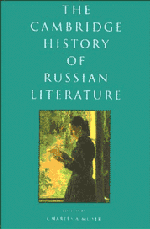Book contents
- Frontmatter
- 1 The literature of old Russia, 988–1730
- 2 The eighteenth century: neoclassicism and the Enlightenment, 1730–90
- 3 The transition to the modern age: sentimentalism and preromanticism, 1790–1820
- 4 The nineteenth century: romanticism, 1820–40
- 5 The nineteenth century: the natural school and its aftermath, 1840–55
- 6 The nineteenth century: the age of realism, 1855–80
- 7 The nineteenth century: between realism and modernism, 1880–95
- 8 Turn of a century: modernism, 1895–1925
- 9 The twentieth century: the era of socialist realism, 1925–53
- 10 The twentieth century: in search of new ways, 1953–80
- 11 Afterword: Russian literature in the 1980s
- Bibliography
5 - The nineteenth century: the natural school and its aftermath, 1840–55
Published online by Cambridge University Press: 28 March 2008
- Frontmatter
- 1 The literature of old Russia, 988–1730
- 2 The eighteenth century: neoclassicism and the Enlightenment, 1730–90
- 3 The transition to the modern age: sentimentalism and preromanticism, 1790–1820
- 4 The nineteenth century: romanticism, 1820–40
- 5 The nineteenth century: the natural school and its aftermath, 1840–55
- 6 The nineteenth century: the age of realism, 1855–80
- 7 The nineteenth century: between realism and modernism, 1880–95
- 8 Turn of a century: modernism, 1895–1925
- 9 The twentieth century: the era of socialist realism, 1925–53
- 10 The twentieth century: in search of new ways, 1953–80
- 11 Afterword: Russian literature in the 1980s
- Bibliography
Summary
The 1840s – that “marvellous decade,” in Paul Annenkov’s phrase – occupy a special place in the historical memory of the Russian intelligentsia. For most of its length the decade was a time of great philosophical, cultural, and literary beginnings, which then came to an abrupt ending in the so-called “epoch of censorship terror” commencing with the European revolutions of 1848 and continuing through Russia’s losing involvement in the Crimean war of 1853–6. The second portion of the years from 1840 to 1855 transformed the entire period from a beginning to something more like a transition, from the great years of romanticism to the time of the Russian realists who would win for Russian literature a worldwide reputation. It was also a period of continuing transition from an age of poetry to an epoch when prose writing dominated the literary arena.
Philosophically, the early 1840s were a time when young Russians eagerly followed and endlessly discussed all the latest theories, emanating especially from Germany. Young people formally enrolled in universities found it much more interesting to spend their hours participating in small “circles” and all-night debates about the good, the true and the beautiful, than attending classes. That frame of mind is epitomized in Turgenev’s vignette of an instance when he and Belinsky were summoned to dinner by Belinsky’s wife and the critic objected to being interrupted for a meal when the two of them had not yet settled the question of God’s existence.
- Type
- Chapter
- Information
- The Cambridge History of Russian Literature , pp. 189 - 247Publisher: Cambridge University PressPrint publication year: 1992
- 1
- Cited by



